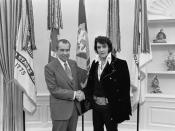Throughout American history, the fear that our leaders may sometimes think themselves above the law has always been evident. The fear is that power brings corruptness. To prevent this, however, the system of checks and balances has been installed into the Constitution. No one branch of government stands above the law in this setup. This point was reasserted in the the Supreme Court case of 1974, United States v. Nixon. This case involved the President of the United States, at that time Richard Nixon, and the people of the United States. The case was based on the infamous Watergate scandal in which Nixon was said to be involved. The case came about when Nixon refused to deliver subpoenad tapes to the Special Prosecutor that could have possibly incriminated him. Nixon attempted to quash this subpoena by claiming executive privelege. The Special Prosecutor argued this claim successfully. The President then appealed this ruling from the District Court to the Court of Appeals.
In the Appeals Court, the Special Prosecutor filed for a writ of certiorari which was petitioned by the President. Both petitions were granted and handed to the Supreme Court.
When the case reached the Supreme Court, the basic arguements were as follows. President Nixon's attorneys argued that the District Court was out of its jurisdiction when it issued the subpoena to Nixon, making the case void. They stated that the dispute between the President and the Special Prosecutor was strictly executive, and by mediating them, the court broke the doctrine of seperation of powers. They also argued with executive privilege, the right of the President to withold information from Congress. To this, the District Court said that the judiciary, not the President, was the final arbiter of a claim of executive privilege. The Court also argued...


